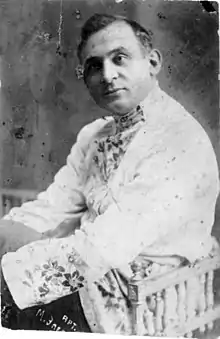Mikhail Epelbaum
Mikhail Epelbaum (Russian: Михаил Иосифович Эпельбаум Mikhail Iosifovich Epel'baum, Yiddish: עפּעלבױם מיכאל Mikhl Epelboym) (born in Odessa or possibly Brest-Litovsk in 1894, died in Leningrad in 1957) was a well known Russian and Yiddish baritone singer from Russia and the Soviet Union during the first half of the twentieth century.

Biography
Early life
According to many biographies, Apelbaum was born in 1894 in Odessa.[1] However, the Leksikon fun yidishn teater states instead that he was born in Brest-Litovsk and moved to Odessa at age 11.[2] Most biographies agree that he was born into a family of tailors. After studying in a Cheder, he studied in a private Gymnasium in Odessa.[2] He then studied at the Warsaw Institute of Music.[1]
Music and theatre career
From 1910 onwards, Epelbaum started performing in numerous musical and dramatic troupes: I. Korik's and A. Weinstein's in 1910 and 1912, S. Genfer's in 1911, L. Rappel's in 1913 and 1915–16, A. Fishzon's in 1914–15, and N. Lipovsky's in 1916–17.[1] In 1911 he also took part in the An-Sky Expedition in Podolia and Volyn, which collected ethnographic materials about Jewish populations there, including folk songs, which he used as concert material throughout his career.[1]
During the First World War, he apparently enlisted as a soldier but was wounded in combat, and was released from service and immediately returned to acting.[2]
In the mid-1920s, he also performed in some Russian language operas and operettas.[2] In 1926 he gave some concerts in Riga and Berlin, as well as acting in the Yiddish theatre in Paris.[2] He made his first recording in New York City during this time as well, recording with Columbia Records in 1926.
During the period of 1927 to 1933, Epelbaum left the Soviet Union for an extended period to tour in a number of countries in Europe, America, and Africa.[1] He spent ten months performing in Argentina as well as a short time in New York.[2] And during 1928-9 he toured again in Paris, Riga, and Berlin.[2] After he finished that round of tours, he returned to Leningrad, taking up a position at the Musical Comedy Theatre as well as the Regional Philharmonic Society.[1] During this time he was awarded the title of People's Artist of the Russian SFSR.[1]
It was in the 1930s that he recorded the majority of his 78 rpm discs for Soviet record labels such as SovSong, Gramplasttrest, Leningrad LRK and Muztrest, mostly consisting of Yiddish folk or comedic songs.[3] During the Second World War, Epelbaum was evacuated to Siberia, and continued to give concerts in Novosibirsk.[1] After the war ended, he returned to Leningrad and also resumed his concert performances in other Soviet cities.[1]
Arrest and deportation
In 1949, in the midst of a crackdown on Jewish culture in the Soviet Union, Epelbaum was arrested and sentenced to 10 years.[1] His wife Rosalia Epelbaum was also convicted.[1]
Rehabilitation
Epelbaum was rehabilitated in 1954 and returned to Leningrad.[1] However, he was not allowed to resume his concert schedule on a permanent basis, rather being allowed to only accept occasional contracts.[1] As with Nechama Lifshitz, Zinovy Shulman and other contemporaries, the Jewish content of his material was highly censored, and was required to be performed alongside Russian language music.[1]
Epelbaum died not long after, in Leningrad in 1957.
References
- "Михаил Эпельбаум". Кино-Театр.РУ. Retrieved 22 July 2020.
- "Misha Appelbaum". Museum of Family History. Retrieved 22 July 2020.
- "Mikhail Apelbaum". yiddishmusic.jewniverse.info.